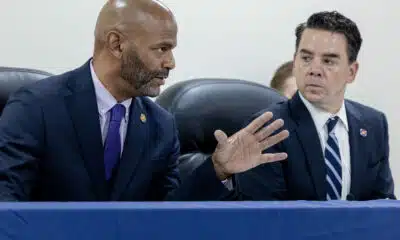Mississippi News
Is regional system answer to Jackson water crisis?
State, business leaders consider regionalization of Jackson water system. Local officials hate the idea
When the latest emergency in Jackson’s long-running water crisis hit — most of the city lost water again from a combination of broken or ill-maintained machinery and flooding — state leaders began talking of intervention.
And one of the first ideas floated in backroom discussions was creating a “regional authority” to oversee and overhaul waterworks for Jackson and, ostensibly, other areas, particularly those surrounding areas already on the capital city’s system.
This would make sense. Regionalization and consolidation of water and sewer services has been a trend nationwide. Regionalization appears to help garner favor — and funding — from Congress and environmental agencies. Studies by experts say regional approaches allow systems to comply with stricter standards, connect unserved communities to water and sewerage and, importantly, save customers money using economies of scale for upgrades and repairs.
Jackson’s chamber of commerce has called for creation of a regional water authority. And there’s growing sentiment among many Mississippi leaders that someone other than the city of Jackson should run or help run the system. But so far, talk of a regional authority for Jackson and surrounds has gained little traction, particularly with Jackson Mayor Chokwe Antar Lumumba and leaders in areas around Jackson.
The realpolitik is a true regional water system would be a tough sell in the Jackson Metro Area. It would appear no other cities want to be in a regional water authority with Jackson, and state leaders are unlikely to force it. A regional authority, as it stands, would more likely include only Jackson and some small systems in Hinds County and be run largely by the state, with Jackson having some say, but not control over the system.
After Hurricane Katrina destroyed systems, Mississippi Gulf Coast governments formed regional water authorities and a large regional wastewater authority and it helped them pull down hundreds of millions of federal dollars to rebuild and expand. It took some doing, politically, with local governments reluctant to give up any autonomy. But ultimately then-Gov. Haley Barbour and legislative leaders sold them on the concept.
Across the country, as aging large or poorly amortized smaller systems struggle to meet regulations and finance upgrades, there’s been a realization they can’t afford it on their own. There’s power in numbers, and economies-of-scale savings for residents. Sometimes, there’s special money available for regionalization.
READ MORE: Jackson’s water system, by the numbers
Some states, such as North Carolina, incentivize consolidation. Others, such as California, force it. Kentucky has long been a leader in water system regionalization, and since the 1970s has reduced its more than 3,000 water systems to less than 800.
Some cities, such as Detroit and Harrisburg, Pa., have used regionalization to navigate water crises like Jackson’s with some success.
But for Mississippi’s capital city, the trend is going the other way — other cities or areas served by its water and sewerage have either left or are trying to. Some large institutions have dug their own wells, and others are considering it. Jackson has run regional sewage operations for Hinds, Madison and Rankin counties since 1973, but recently, West Rankin Utility Authority pulled out and has built its own new plant to serve Brandon, Flowood, Pearl, Richland and other areas.
Byram wants out
“I have concerns this thing has finally hit bottom, and we need a change, need to move on,” said Richard White, mayor of Byram, a relatively new city bordering the capital city and served by Jackson’s water system. “… We need to be dealing with development, parks and recreation, not having to worry about our water. We’re going to move forward with our own system.”
White said being on Jackson’s water system has provided nothing but frustration for residents of the fledgling city of about 13,000 people to Jackson’s south, with water outages and boil-water notices, bills for some Byram residents double those inside Jackson and reported breaks taking Jackson weeks to repair. Plus, Byram has no representation or say in how the system is run.
State Sen. David Blount, who represents parts of Jackson and Byram, said that whatever solutions are found for Jackson’s water crisis, “It is essential for me that the people of Byram have a voice.”
“After Hurricane Katrina a lot of people in Mississippi felt like we weren’t being heard in the national conversation because so much focus was on New Orleans,” Blount said. “Obviously, the people of Jackson deserve attention, but the people of Byram cannot be forgotten in this … There are people in Byram paying more than double, and getting worse service, if that’s imaginable.”
For Byram residents and businesses further than one mile outside Jackson’s city limits, the Public Service Commission sets their rates, and they are commensurate with what Jackson residents pay. But for those within one mile — a large portion of Byram’s most populated area — the Jackson City Council sets their rates.
“That 1 mile is at double (Jackson’s) rates,” White said. “I heard from one family — they have two small children — that was getting bills for $200 a month for water … Then I’ve got other people who call me all the time and say they haven’t gotten a bill in six months.”
Byram leaders have hired an engineering firm to price a buyout of Jackson’s water pipes in the city and installing new wells and tanks and petitioned the Public Service Commission for its water independence. White said that given a green light, Byram could have its own system up and running within a couple of years. Byram already has its own sewerage. He said that given Jackson’s problems in maintaining its system, Byram would be doing it a favor by peeling off.
White said joining a regional authority with Jackson would be a nonstarter for Byram and, “That may be too much government, too, creating a new group.
“We want out.”
Clinton creates regional authority, but not with Jackson
Clinton, Jackson’s neighbor to the west with a population of more than 28,000, has its own infrastructure issues.
To meet wastewater discharge regulations, the city needs to build a 19-mile, $97 million pipeline to the Big Black River by 2030, largely because Jackson and other areas are already discharging more treated (and sometimes untreated) wastewater than the Pearl River can handle.
Mayor Phil Fisher and other city leaders have been working on this issue for years. They have a concise plan and have secured about $25 million in funding “from several separate pots” so far and believe they have matters in hand. They hired a lobbyist to help secure funding from Congress. They are forming a regional authority with neighboring cities of Bolton and Raymond, who would face similar wastewater issues if left on their own.
“Congress appears to prefer an authority rather than Raymond and Bolton just feeding into Clinton,” Fisher said. “You need a coordinated effort that makes sense and answers a bigger need. From Bolton’s and Raymond’s perspective, they need an authority, they could never come up with the match for any of this, and even Clinton’s too small for that. Coming together allows us a chance to work as a group and plan, and then Congress looks at that with a lot more enthusiasm than if Raymond just showed up and said (environmental regulators) have an issue and we need money and put it together really quick.”
Fisher said he believes Clinton’s detailed, long-range planning for the project and using a regional approach will allow the project to move forward, including with help from a state infrastructure matching program.
And instead of looking at the large wastewater project as a problem, Fisher said it’s an opportunity for Clinton and surrounding areas.
“That’s going to be 19 miles one way to the Big Black, paralleling I-20,” Fisher said. “So going both ways, that’s going to be 38 miles of mostly unused land that that can be converted to residential, commercial, retail development. All it’s lacking is water and sewer. We have trucking, rail, the port in Vicksburg and if Hinds County would ever build it we’ll have air. This land along I-20 could become the largest and most valuable economic development area maybe in the Southeast.”
Fisher said at least one small rural water association has expressed interest in joining in with the authority’s sewerage and he believes others would follow suit and, “I envision one day all coming together under one water association.”
But not with Jackson.
Fisher said that, given Jackson’s water and sewage problems, it wouldn’t make sense financially or politically for Clinton to join in with its larger neighbor.
“I think I would be run out of town if I made that proposal,” Fisher said. “The only way I could see anyone joining an authority with Jackson would be if they had an equal number of votes on running it, no matter their size.”
But Fisher said it’s in Clinton’s — and the entire state’s — best interest for Jackson’s water and sewer issues to be resolved.
“Nationwide, people don’t know that Jackson and Clinton have two separate systems,” Fisher said. “… Last year, Jackson was No. 1 in murder rate per capita. People are seeing the water crisis now. It makes it difficult for surrounding cities to go out and make a good story. Jackson needs to fix its problems, quit finding excuses or finger pointing or getting up at a press conference and criticizing others.”
But Fisher, whose city has for years used a private company to manage some sewer operations but still owns the system, provided a warning to his neighboring city about full-scale privatization.
“If you sell your system, they’ll buy it, but the hook is, you get money up front and they won’t change the rates for five years, but then it’s Katy bar the door,” Fisher said. “Then, you’ll have the legislative mindset with city leaders: ‘Hey, I didn’t raise your rates, they did.’ Everybody elected will have something to hide behind, but at the end of the day the city loses control over rates.”
Jackson opposed to giving up control
At least publicly, the only common denominator idea for fixing Jackson’s water crisis mentioned by Gov. Tate Reeves, Lumumba and others is privatization, at least of operations and maintenance of Jackson water. But privatization comes with a cost, usually borne by water customers.
Studies have shown that privatization can leave residents with higher water bills, poor service and loss of control to fix problems. One study by the nonprofit Food and Water Watch recently showed investor-owned utilities typically charge 59% more for water and 63% more for sewer service than government utilities.
Nationwide, many cities that turned to privatization years ago are now ending their contracts, taking their utilities back over and partnering with neighboring communities.
Mayor Lumumba has said he has talked with a company about contracting out operations and maintenance of the system, but is adamant he doesn’t want the city to lose ownership or major control of the system. He has in the past accused state leaders of wanting to use privatization as a power and money grab against Jackson, and he said private companies don’t do work out of benevolence, but “They want to extract a profit from you.”
He has also expressed skepticism about joining a regional authority.
Some leaders and pundits have discussed an outright state takeover of the system, but legally and politically that would be arduous, and as some have pointed out, the state has no real expertise in running a water system or manpower on hand to do so. As one observer recently put it, that would be “like getting a D student to do your homework for you.”
Another option proposed has been a temporary receivership, perhaps overseen by the Public Service Commission until problems are resolved.
Jackson’s legislative delegation hasn’t endorsed a specific solution, but most share Lumumba’s opposition to the city losing ownership or control of its system.
“I was actually having a conversation at lunch today about regionalization,” Rep. Chris Bell, D-Jackson, said last week. “I’m not sure if that’s the best route. I’m still researching it … But that’s an issue, anyone wanting to work as a region. Didn’t Rankin County just come off of our sewer? That’s another blow, $3 million to $5 million. You’ve got Byram wanting to leave. I’m hearing the Country Club of Jackson is trying to do its own water well, and Jackson State. Honestly, the attitude of those folks out there is they don’t want anything to do with us in the first place, and the only way they would join us is if they have a majority of board members — and that would be an entire fight all over again.”
“If there is any private company brought in, I would still support the city owning it,” Bell said. “At the end of the day, if it makes sense for someone to run it under contract, that’s one thing. But just having the state take over… .”
State Sen. John Horhn, D-Jackson, said he’s mostly been focused on resolving the current emergency with water, and that any talk of long-range solutions “is in the very early stages.”
“Whatever we do has to be inclusive and well thought-out and very deliberate,” Horhn said. “… I lean towards the city being able to hold onto its assets, but it’s very clear it needs to outsource operations. The mayor himself has let it be known he’s been in contact with a third-party administrator”
As for creation of a regional authority to run the system, Horhn said, “All that’s above my pay grade. But I favor the city being able to retain ownership of its assets.”
This article first appeared on Mississippi Today and is republished here under a Creative Commons license.
Mississippi News
Suspect in Charlie Kirk killing is charged with murder as prosecutor says DNA found on rifle trigger
SUMMARY: Tyler Robinson, 22, was charged with the murder of conservative figure Charlie Kirk, shot Sept. 10 at Utah Valley University. Robinson confessed via text to his partner and left a note expressing intent to kill Kirk, citing hatred. DNA linked Robinson to the rifle used. Prosecutors revealed Robinson planned the attack for over a week and targeted Kirk, a key conservative youth leader. Robinson’s political views shifted after dating a transgender man, causing family tensions. After the shooting, Robinson discarded evidence and urged his partner to delete texts. FBI investigates possible wider connections. Charges include murder with potential death penalty enhancements.
Read the full article
The post Suspect in Charlie Kirk killing is charged with murder as prosecutor says DNA found on rifle trigger appeared first on www.wjtv.com
Mississippi News
Suspect in Charlie Kirk assassination believed to have acted alone, says Utah governor
SUMMARY: Tyler Robinson, 22, was arrested for the targeted assassination of conservative activist Charlie Kirk in Orem, Utah. Authorities said Robinson had expressed opposition to Kirk’s views and indicated responsibility after the shooting. The attack occurred during a Turning Point USA event at Utah Valley University, where Kirk was shot once from a rooftop and later died in hospital. Engravings on bullets and chat messages helped link Robinson to the crime, which was captured on grim video. The killing sparked bipartisan condemnation amid rising political violence. President Trump announced Robinson’s arrest and plans to award Kirk the Presidential Medal of Freedom.
The post Suspect in Charlie Kirk assassination believed to have acted alone, says Utah governor appeared first on www.wjtv.com
Mississippi News
Americans mark the 24th anniversary of the 9/11 attacks with emotional ceremonies
SUMMARY: On the 24th anniversary of the 9/11 attacks, solemn ceremonies were held in New York, at the Pentagon, and in Shanksville to honor nearly 3,000 victims. Families shared personal remembrances, emphasizing ongoing grief and the importance of remembrance. Vice President JD Vance postponed his attendance to visit a recently assassinated activist’s family, adding tension to the day. President Trump spoke at the Pentagon, pledging never to forget and awarding the Presidential Medal of Freedom posthumously. The attacks’ global impact reshaped U.S. policy, leading to wars and extensive health care costs for victims. Efforts continue to finalize legal proceedings against the alleged plot mastermind.
The post Americans mark the 24th anniversary of the 9/11 attacks with emotional ceremonies appeared first on www.wcbi.com
-
News from the South - North Carolina News Feed6 days ago
What we know about Charlie Kirk shooting suspect, how he was caught
-
News from the South - North Carolina News Feed7 days ago
Federal hate crime charge sought in Charlotte stabbing | North Carolina
-
Our Mississippi Home5 days ago
Screech Owls – Small but Cute
-
News from the South - Arkansas News Feed6 days ago
NW Arkansas Championship expected to bring money to Rogers
-
News from the South - North Carolina News Feed7 days ago
Under pressure, some immigrants are leaving American dreams behind
-
Mississippi News Video7 days ago
Mississippi Science Fest showcases STEAM events, activities
-
News from the South - Florida News Feed7 days ago
CBS Miami highlights free mammogram program with mobile mammovan
-
News from the South - Tennessee News Feed6 days ago
What to know about Trump’s National Guard deployment to Memphis



















































